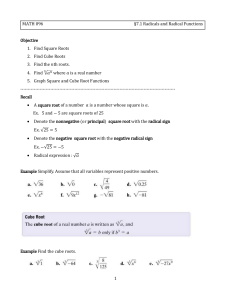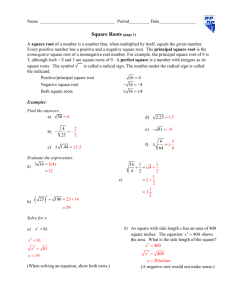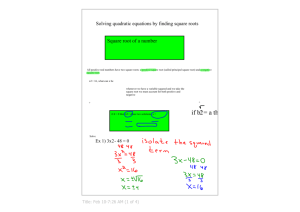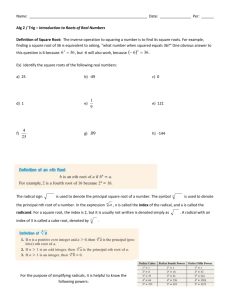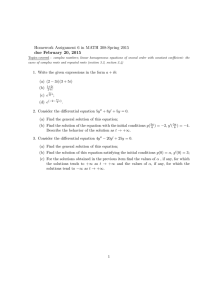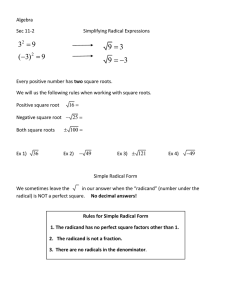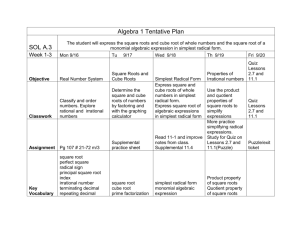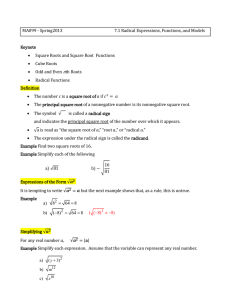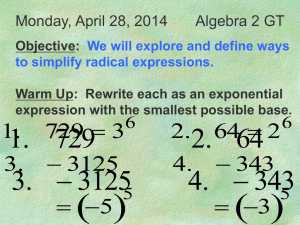Objective: n 71 Roots and Radical Expressions February 05, 2010
advertisement
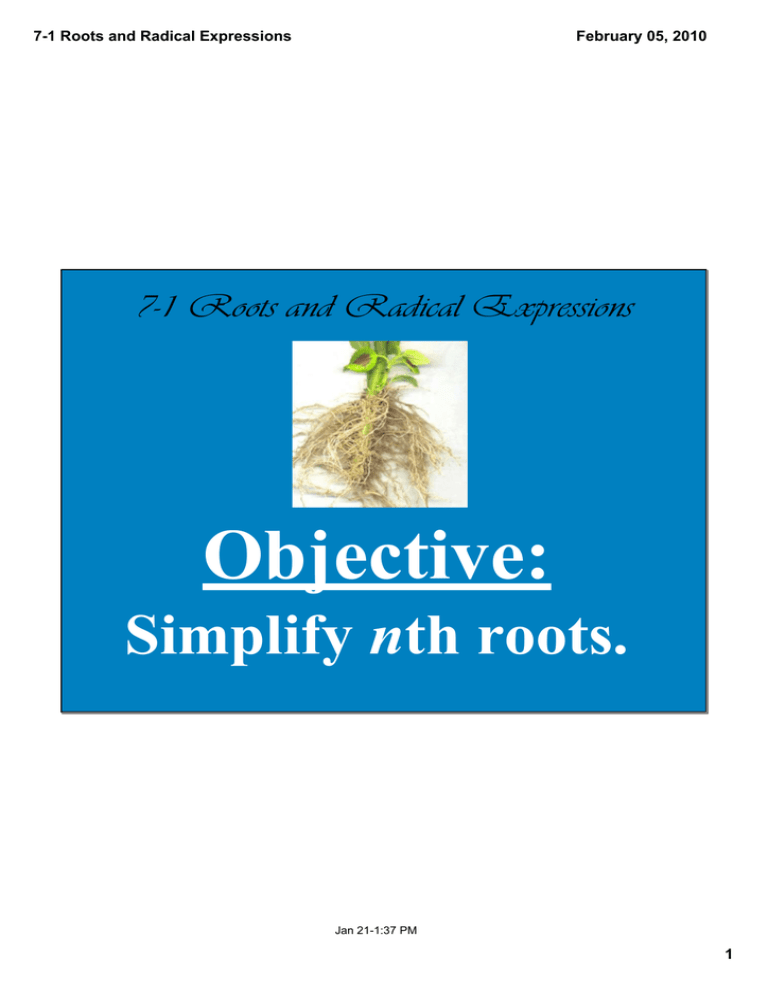
7­1 Roots and Radical Expressions February 05, 2010 7­1 Roots and Radical Expressions Objective: Simplify nth roots. Jan 21­1:37 PM 1 7­1 Roots and Radical Expressions February 05, 2010 Check Skills You'll Need Write each number as a square of a number. 1. 25 2. 0.09 3. 4/49 Write each expression as a square of an expression. 4. x10 5. x4y2 6. 169x6y12 Jan 21­1:40 PM 2 7­1 Roots and Radical Expressions February 05, 2010 List the squares of all the numbers 1‐15. Nov 3­7:32 AM 3 7­1 Roots and Radical Expressions February 05, 2010 List the cubes of all the numbers 1‐10. Nov 3­7:32 AM 4 7­1 Roots and Radical Expressions February 05, 2010 List the cube roots of all the numbers 1‐1000. 1­ 1000 ­ Nov 3­7:32 AM 5 7­1 Roots and Radical Expressions February 05, 2010 Look at the following pattern: Since 52 = 25, 5 is a square root of 25. Since 53 = 125, 5 is a cube root of 125. Since 54 = 625, 5 is a fourth root of 625. Since 55 = 3125, 5 is a fifth root of 3125. This pattern leads to the definition of nth root. Jan 21­1:50 PM 6 7­1 Roots and Radical Expressions February 05, 2010 Since 24 = 16 and (‐2)4 = 16, both 2 and ‐2 are fourth roots of 16. Since there is no real number x such that x4 = ‐16, ‐16 has no real fourth root. Since ‐5 is the only real number whose cube is ‐125, ‐5 is the only real cube root of ‐125. Jan 21­1:57 PM 7 7­1 Roots and Radical Expressions February 05, 2010 Find all the real cube roots. a. 0.008 (0.2)3= 0.008 b. ‐1000 (‐10)3 = ‐1000 c. 1/27 (1/3)3 = 1/27 Jan 21­2:23 PM 8 7­1 Roots and Radical Expressions February 05, 2010 Find all the real fifth roots. d. 0 e. ‐1 f. 32 0 ‐1 2 Jan 21­2:29 PM 9 7­1 Roots and Radical Expressions February 05, 2010 A radical sign is used to indicate a root. The index gives the degree of the root. The number under the radical sign is the radicand. When a number has TWO real roots, the POSITIVE root is called the PRINCIPAL ROOT. Jan 21­2:32 PM 10 7­1 Roots and Radical Expressions February 05, 2010 When a number has TWO real roots, the POSITIVE root is called the PRINCIPAL ROOT. The PRINCIPAL fourth root of 16 is 2 4 because equals . The other ∜16 ∜2 fourth root of 16 is written as ­ , ∜16 which equals ­2. Jan 23­1:34 PM 11 7­1 Roots and Radical Expressions February 05, 2010 Find each real number root. a. ∛-8 b. √-100 c. ∜81 Jan 23­1:58 PM 12 7­1 Roots and Radical Expressions February 05, 2010 Jan 23­2:10 PM 13 7­1 Roots and Radical Expressions February 05, 2010 Simplify each radical expression. a. √4x6 b. ∛a3b6 c. ∜x4y8 √22(x3)2 ∛a3(b2)3 ∜x4(y2)4 √(2x3)2 ∛(ab2)3 ∜(xy2)4 2|x3| ab2 |x|y2 Absolute value symbols ensure that the root is positive when x is negative. Absolute value symbols must not be used here. If a is negative, then the radicand is negative and the root must also be negative. Absolute value symbols ensure that the root is positive when x is negative. They are not needed for y because y2 is never negative. Jan 23­2:19 PM 14 7­1 Roots and Radical Expressions February 05, 2010 Feb 5­8:30 AM 15 7­1 Roots and Radical Expressions February 05, 2010 HOMEWORK p. 372 #1 ­ 28, 39 ­ 54 Jan 24­8:30 AM 16
